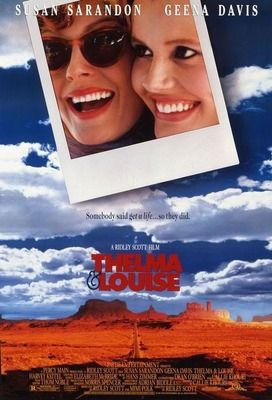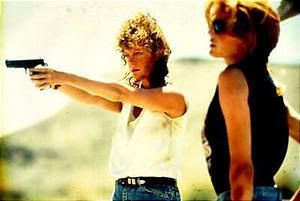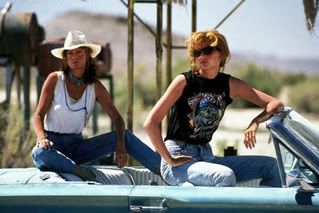
Thelma & Louise
1991
Director: Ridley Scott
Starring: Susan Sarandon, Geena Davis, Harvey Keitel
Louise (Sarandon) is a waitress at a diner and Thelma (Davis) has a boor of a husband. The two plan a weekend getaway, but wind up shooting a would-be rapist, and then find themselves on the run. Their vacation morphs into something beyond their imagination as the two panic, grow desperate, then embrace their newfound lawlessness.
I feel like I’m a little late to the game with Thelma & Louise. I only just saw it for the very first time a few days ago, yet I knew the ending, mostly from The Simpsons episode where it was heavily parodied. I feel like Thelma & Louise is a cultural touchstone of the early 1990s, yet seeing it for the first time now, in 2012, it didn’t have the same kind of impact I was expecting. I enjoyed it, mostly for the feminism inherent in a story line like this, but I think it would have had greater effect on me had I seen it twenty years ago. Today, ass-kicking gun-toting females have, blessedly, become highly visible in action films. We have seen the Lara Crofts, the Alices, the Ziva Davids, and they have been proven capable of opening and carrying a film or television series. Prior to Thelma & Louise, there was Ripley and there was Sarah Connor in the Terminator films, and that pretty much taps me out of ass-kicking females. It’s not nearly as much of a “novelty,” for lack of a better word, to see women take charge anymore. I’m very grateful for that, but it does help explain why I wasn’t as blown away, pun intended, by Thelma & Louise as I was quite expecting.

That being said, I do think that the film holds an interesting niche of the ass-kicking females oeuvre. The female western is, as yet, still largely unexplored. There is the occasional dabble in this corner (Bad Girls, I’m looking at you) but the vast majority of westerns are still testosterone-filled films. All of which makes Thelma & Louise a very notable film. Although it fits more easily into the classic road trip movie motif, there was a turning point for me when I watched it when it suddenly became a western instead. When Louise is driving their Thunderbird through Monument Valley at night, I was awestruck. Monument Valley is the location of nearly all classic western films (John Ford was highly enamored of it), and here, Ridley Scott is taking me through it again, but this time, in darkness. It was an incredibly powerful scene for me, and a powerful connection for Scott to make. Once I saw Monument Valley, I realized that the film could not take place anywhere else in the country than in the Southwest. Everything that Thelma and Louise go through, their journey together, is tailor-made for The West. Road trip movies can take place anywhere. Westerns, though, are tied to locations. As Thelma and Louise metamorphose into modern bandits, their wardrobe changes as well; they start to dress like classic western characters. After seeing Thelma & Louise, I realize that we need more women’s westerns.
The two central women are key to the success of this film, clearly. Susan Sarandon is fascinating as Louise, but Geena Davis’ Thelma left me a little disappointed. She’s a dip. She’s a goofy dip, and she wasn’t nearly as emotionally complex as Sarandon’s character. Thelma is a screwball; most of the time, she annoyed me. Louise, thankfully, provided more heft. The dark past, the honest relationship with a man she has a deep connection with (played with a lovely low key by Michael Madsen), the growing sense of desperation – Sarandon is brilliant in the film.
I also very much enjoyed the role of men in the film. As a story about two women fighting back against an unjust patriarchal society by reverting to crime, you could expect the men to be stereotypical misogynistic swine. While there are several of such caricatures throughout the film, the two men with the largest roles are, wonderfully, well-rounded characters. Michael Madsen as Jimmy, Louise’s boyfriend, is phenomenal as a man who loves his girlfriend enough to let her go. Harvey Keitel, despite not quite pulling off a Southern drawl (really, who makes Harvey Keitel do a Southern drawl) is also thoroughly enjoyable as the police officer chasing after the women. He is sympathetic and likeable in his dogged pursuit, mostly because he’s the only man in the picture who seems to actually understand what these women are going through.

There was one line in the film that really resonated with me, and informs what’s happening at the heart of the film. Right after their initial crime, when the two are panicking in the car, Thelma wants to go to the cops, but Louise says no. “Who would believe us?” she says. “We don’t live in that kind of world, Thelma!” That line – we don’t live in that kind of world – that struck me deeply. We don’t live in the kind of world where if a woman is dancing with a man, it doesn’t mean she wants to have sex with him. Where rape is never justified. You know, the sad thing is, I still don’t think we live in that kind of world. Although this movie was made twenty years ago, the plight of Thelma and Louise is still just as fresh today. I long for the day when we can look back and chortle to ourselves at how ridiculous it was that two women in Arkansas didn’t think the cops would believe them when they said a man was attempting to rape one of them. I just don’t think we’re there yet.
There’s a lot of sociological message thrown in Thelma & Louise, but it’s also a good, solid, entertaining movie.
Arbitrary Rating: 7/10 (Geena Davis was really annoying)
No comments:
Post a Comment